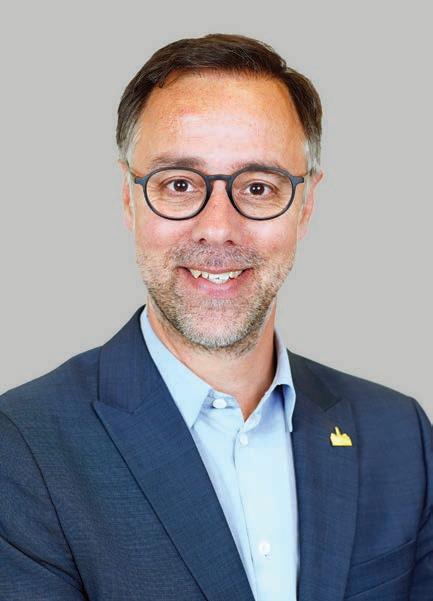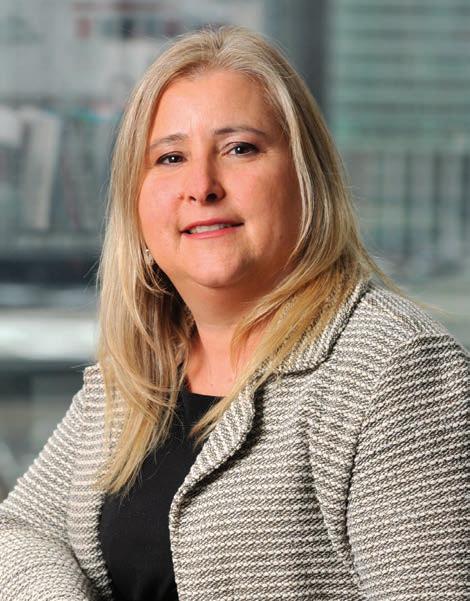
7 minute read
A RESILIENT, GREEN, INCLUSIVE CITY
INTERVIEW BY NATHALIE SAVARIA
Since the beginning of the pandemic, more than $260M has been allocated to local firms and businesses to support Montréal’s economic recovery, with $60M of those funds earmarked for the city’s 2021 Recovery Plan, Act Now to prepare for Recovery.
T
MONTRÉAL’S GRAND DESIGN: TRANSFORM ITS ECONOMY
hat is made abundantly clear in the Montréal 2030: A Strategic Vision report, a guide to the city’s orientations over the next few years, which includes measures to cope with the pandemic. The strategic plan will focus on three key elements: economic resilience, eco-friendly transition and social inclusion.
"The social economy is a dynamic response to these three issues, and Montréal is devoting a substantial part of its budget to this approach. No city in the world is doing that. A strong, bold position has been taken," said Luc Rabouin, mayor of the Plateau-Mont-Royal borough and member of the executive committee responsible for economic and business development, and design.
He firmly believes in the plan. The social economy "is not a sector of the economy, but a way of doing business," he added. Its primary goal is to maximize social benefits before financial profitability. "Social inequalities intensified during the pandemic, so increasing the role of the social economy is a structural response to that issue."

LUC RABOUIN
Mayor of the Plateau-Mont-Royal borough and member of the executive committee responsible for economic and business development, and design City of Montréal
"To ensure an inclusive recovery, the social economy, by its collective legal form, leads to a better sharing of wealth all round. As we all know, to maintain the quality of life and security in a city we must collectively ensure that our model is as inclusive as possible."
But the city’s dynamics must be based on short-term actions to address the health crisis. In addition to social inclusion, economic resilience is also important, as is engaging in a transition to an eco-friendly economy.
DOING BUSINESS DIFFERENTLY
In Montréal the social economy represents some 2800 firms and 67,000 jobs, annually generating $11.7G of revenue. Many of those jobs are held by women and people from diverse social and ethnic backgrounds.
Social economy enterprises are present in various economic sectors, and the idea is attracting interest among young entrepreneurs "who have a strong sense of social and environmental responsibility and are looking at collective business models," noted Mr. Rabouin. He mentioned PIVOT, the first-ever architectural cooperative (founded in 2017) and L’UTILE, a non-profit organization created by students dedicated to the promotion and development of cooperative housing for students in Montréal and Québec City.
He noted that "before the crisis Montréal was in the midst of an economic boom, and all indicators suggested ongoing growth. Last year, however, an important report from the Foundation of Greater Montréal pointed out that the positive spinoffs of that flourishing economy benefited some more than others, a phenomenon now even more pressing since the beginning of the pandemic. We want to make sure that the economic recovery is green and inclusive. We have an opportunity to adjust our focus to make sure that a maximum number of people benefit from Montréal’s economic boom, while also rising to the challenge of climate change. The social economy can be of great assistance in addressing those challenges."

The City of Montréal is calling on the social economy to help the restaurant sector, very hard hit by the pandemic, notably by curbing the growing encroachment of digital platforms owned by multinationals. The Québec government has adopted legislation to limit the high commission fees seen during the pandemic, and the City has decided to put a permanent solution in place. "Very soon we will be contacting the social economy community with a call for proposals for a viable longterm and affordable online system for an ordering and delivery solution for restaurant owners. What we want is a consortium-type solution. We will invite people to come together to develop a proposal. If we think it’s sound, we’ll fund it," said Mr. Rabouin.
Social economy initiatives are just one part of the City’s efforts to support the city’s economy in the short term and to prepare for a green and inclusive recovery.
THE DOWNTOWN CORE STRONG LEADERSHIP FOR THE CITY
The downtown core is the geographic area most affected by the pandemic, accounting for 14.4% of jobs in the Metropolitan Census Area. In its 2021 recovery plan, Montréal is devoting $10 million to rebooting the city centre, while the provincial government will contribute an additional $15 million.
For Mr. Rabouin, damage to the downtown core is both cyclical and structural. The former (e.g. decline in hotel occupancy) is expected to be resolved after the pandemic, while the latter (e.g. telecommuting) will profoundly change the future of the city centre.
According to Véronique Doucet, director of the municipal Economic Development Service, many of the 300,000 downtown employees have not returned to their offices. In all likelihood telecommuting is here to stay, at least in hybrid form. Consequently office buildings, like the downtown core, will need to change accordingly and provide an attractive experience for workers. The City’s plan includes financial assistance for workspace conversions in office towers, along with incentives for small businesses to relocate there. Urban design, including outdoor workspaces, is another focus of the City’s thinking. They are to be set up this summer.
At the same time, the City has set up a committee with its partners to facilitate a safe return to work for employees
in large buildings, at least until the vaccination rollout is completed. "It’s not just about design, it’s about perceptions," said Ms. Doucet. "We need to restore a sense of safety and security for people who work in large office towers." Protocols will also be established for colleges and universities, when regular in-person classes are expected to resume this autumn.
The resilience of the downtown core is thus paramount. "The pandemic demonstrated that it is the economic sector itself, not just physical location, that contributes to the overall economy of Québec and to its international influence. Government authorities must recognize the economic importance of the downtown core for Montréal, Québec and Canada," said Luc Rabouin, who is hoping for the best.

THE CITY IS WORKING ON IT. IT’S TIME NOW TO SHIFT TO AN ECO-FRIENDLY ECONOMY
He cites as an example Montréal’s manufacturing base, a driving force in the Québec economy. "We need to ensure that our manufacturing companies continue to plan their activities in an innovative and creative fashion, with an emphasis on reducing at source and reusing materials such as waste, which then becomes the raw material for another company."
A green transition is necessary "because the city needs to develop more clean technology companies, encourage new technologies, reduce its waste and solve problems related to single-use plastics and products made with non-recyclable materials." And to achieve that goal, Montréal is counting on the circular economy, among other things (see p.30).
This new shift will entail coaching and financial support for businesses, as companies might be required to modify their built environment, their business model and their technologies, or retrain their workforce, a challenge Mr. Rabouin is well aware of.
INCLUSION AN URGENT IMPERATIVE FOR TOMORROW’S ECONOMY
This major transition will obviously have an impact on the workforce. "Talent is the key to the development of the city’s economy. We must ensure that we have enough workers to meet our present and future needs. We also need to support more vulnerable employees who require retraining. We must provide training and opportunities for career development that will give them skills useful in other sectors of the economy. The City is working with stakeholders to determine future skill requirements in order to provide the tools and support that will allow for a gradual shift toward this new approach," said Ms. Doucet.
JBC MÉDIA BY DENIS BERNIER
VÉRONIQUE DOUCET
Director of the city’s Economic Development Service City of Montréal
Although they were a response to a specific context, the measures implemented in both phases of the City’s stimulus plan laid the foundation for more resilient, greener and more inclusive economic development.
Certain sectors were hard hit by the crisis: the retail sector (10.3% of jobs in 2019), the cultural and creative sector, and food service and restaurants (a total of 10.9% of jobs in 2019). While these sectors were able to benefit from federal rent and wage assistance programs, they also needed to change and adapt to increase their resilience.
Despite its strong economy, the current crisis has made Montréal aware of the importance of certain sectors of activity such as the bio-food industry. "Food resilience is one of the things we need to work on. We need to produce more within our territory and reduce the travel time for products we consume, rather than importing the majority of them," said Luc Rabouin. As regards the various sectors of economic activity, "We need to determine which ones are really fragile, which absolutely must be part of our future economy, and what we need to do to ensure first that they survive and flourish, and then that they play a key role in ensuring the City’s resilience."





